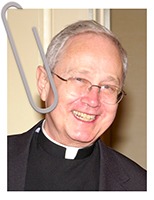This post in the series “A Saint Ahead of His Times” looks at Vincent’s way of doing things.
What Vincent did in addressing the major issues of his day is simply astounding. We can learn so much that is still relevant today by looking at what we might call the “Vincentian Way of Doing Things.”

Four things stand out about Vincent’s way of doing things…
Clarity of mission
Although it came into clearer and more emphatic focus over the second half of his life, his focus centered on following Christ, the Evangelizer of the Poor”.
All writing on management today stresses the importance of mission and focus. Vincent de Paul stated the mission very clearly.
“How happy are we to take on the very mission of Jesus – the mission of proclaiming Good News to the poor. Indeed, we should assist the poor in every way. We should assist them in their material needs. We should assist them in their spiritual needs. We should assist them by ourselves and with the help of others. To do this is to preach the gospel by word and by work.”
This mission led to empowering others through relationships to work tirelessly on behalf of the abandoned, the outcasts, the forgotten ones of society.
Work ethic
One of his best known statements is
“Let us love God my brothers, let us love God. But let it be with the strength of our arms and the sweat of our brow.”
“When you are called from your prayers or the Eucharistic celebration to serve the poor, you lose nothing, since to serve the poor is to go to God. You must see God in the faces of the poor.”
He could not be clearer!
A clear vision of the world as it existed then… and today.
He recognized the world he was in – with all its promise and hope, with all its problems and intrigue.
The world as it is, is a world of angles not angels; a world where people speak of moral principles and act on power principles; a world where reconciliation often means one side wins and the other side must become reconciled to that fact.
The world as it is, is a world where religious institutions often support and justify the status quo, forgetting the radical challenge of Jesus’ words and actions.
The world as it is, is a world where the solution of one problem inevitably creates a new problem; a world where everything is interrelated and interdependent.
His clarity of vision led to addressing needs both immediate and creating long-term solutions.
Vincent was able to bring relief to immediate short-term needs, to situations that demanded quick action on behalf of victims of war, famine and plague.
Unafraid to ask why and what could be done.
Yet Vincent was not satisfied with addressing just immediate needs. He sought ways to remedy the root causes of injustice so that these needs could be eliminated.
Vincent asked the question: “Why can’t women participate in the fullest way in carrying out the mission of the Church?” And then he acted creatively to make his vision come alive.
Vincent saw the sad state of the Church and asked: “Why can’t there be priests on fire with the gospel who will serve the people, especially the poor?”
The world as it is, is a world where the solution of one problem inevitably creates a new problem.
We can ask ourselves
- How do we understand our mission?
- What is our work ethic?
- How well do we understand our world?
- Are we unafraid to ask questions and foster change?


The question is, “What is God asking of us now?” There has been a lot of stress on systemic change for individual people. Here on the (Native American) reservation, the needs are basic food, etc. Covid-19 has put many people out of work in a Nation with a 56 percent unemployment before the pandemic. Pray with us as we study whether or how to reopen a food bank.
I am praying with you and the others, Sr Catherine, and I am asking Bishop Francis A Quinn to pray for us and with us. May the Lord give us the light and the strength to respond to the immediate needs and other needs further down the roads of those who are hurting.
Regarding St. Vincent’s work ethic, these three items particularly and personally (knowing myself, I mean) strike me:
–“We live on the patrimony of Jesus Christ, on the sweat of poor people. When we go to the refectory, we must always think. Have I earned the food that I’m about to eat?’ I’ve often had this thought that puts me to shame: ‘Wretched man, have you earned the bread you’re about to eat, that bread that comes to you from the labor of the poor?’ If we don’t earn it like them, at least let’s pray for their needs.” (SV.EN XI:190-191 https://via.library.depaul.edu/cgi/viewcontent.cgi?referer=&httpsredir=1&article=1037&context=vincentian_ebooks)
–His saying that advanced age is not an excuse not to work (SV.EN XI:123 (https://via.library.depaul.edu/cgi/viewcontent.cgi?article=1037&context=vincentian_ebooks)
–And his warning about those who would “seek only to enjoy themselves and, provided they have enough to eat, don’t bother about anything else.” (SV.EN XII:81 (https://via.library.depaul.edu/cgi/viewcontent.cgi?article=1036&context=vincentian_ebooks)
Whenever I recall how Vincent challenged the role of women in society (or lack of) and how he also challenged the church and fellow priests I am amazed at how radical this thinking was. I wonder how it was received by women and men, many of whom were not likely too pleased.
There must have been a few priests who were not pleased with Vincent challenging their roles and rocking the comfortable boat many lived in.
We need to recall Vincent’s words and actions whenever we face opposition to look at radical ways we may need to consider in order to address the many issues we face.